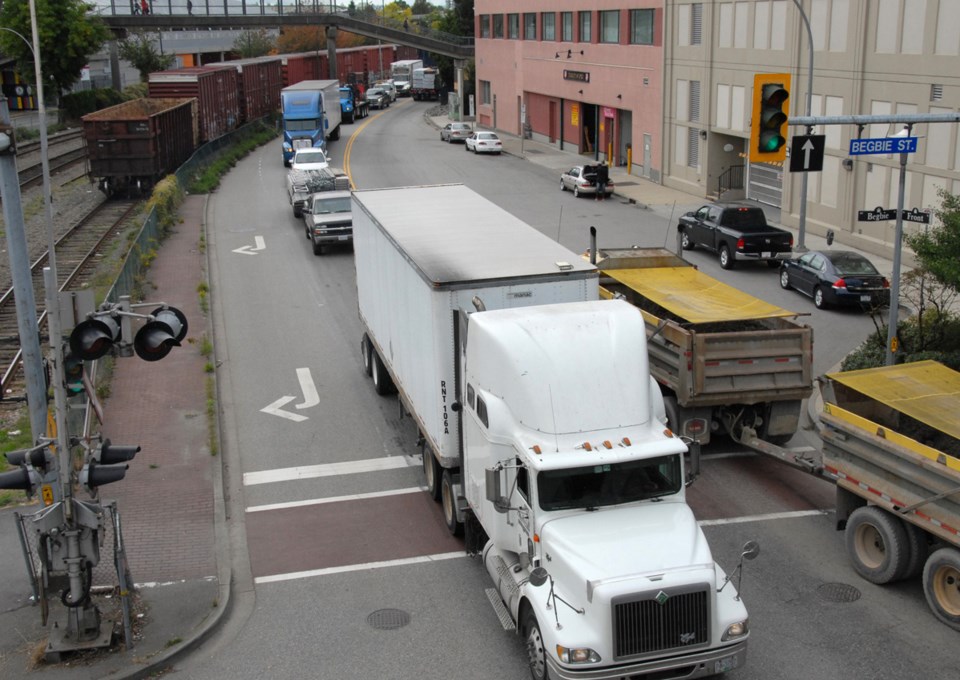Traffic concerns aren’t showing any signs of slowing down in New Westminster.
Ipsos Reid recently surveyed 300 residents about the quality of life in New Westminster and their level of satisfaction with city services. Transportation issues were cited by 51 per cent of respondents as being the top concern.
“There was a big jump compared to previous years,” said Jennifer Renny, a senior research manager at Ipsos Reid.
The Ipsos Reid survey gives respondents a chance to name the most important issue facing the community. Although transportation always tops the list, it’s increased significantly from 25 per cent of New Westminster in 2010, 28 per cent in 2008 and 27 per cent in 2006.
Coun. Jonathan Cote said it’s obvious that “something’s happening out there” that’s causing great concern.
Other issues cited as top concerns of New Westminster residents recently polled by Ipsos Reid were education (14 per cent) and taxation and municipal government spending (12 per cent).
On the topic of quality of life, 96 per cent of respondents said the overall quality of life in New Westminster is very good (39 per cent) or good (56 per cent), a statistic Renny said is “virtually unchanged” since the 2006 survey.
“This is a good report card,” said Mayor Wayne Wright. “I’d be happy to take it to my dad.”
Thirty-six per cent of respondents said the quality of life has improved in the past three years, 48 per cent said it has stayed the same, 14 per cent thought it had worsened and two per cent didn’t know.
Ironically, growth and development was named the top reason (25 per cent) for New Westminster’s improvement in quality of life – and the top reason (36 per cent) why it has worsened.
Residents also provided a variety of other answers when asked why the quality of life has improved in New Westminster. These included: parks/trails/recreation – 18 per cent; more stores/places for shopping – 12 per cent; good amenities and services – 11 per cent; low crime/safe/improved policing – 10 per cent; it’s improved/getting better (unspecified) – nine per cent; clean – nine per cent; more activities/things to do – eight per cent; economic development/more local business – seven per cent; infrastructure – six per cent; demographic changes more younger people and greater diversity of people) – five per cent; roads – four per cent; convenient location/accessible to everything – four per cent; fewer homeless people – four per cent; and waterfront improvements – three per cent.
While growth and development was named the top reason for worsened quality of life at 36 per cent, “too much traffic” was close behind at 35 per cent.
A majority of survey respondents (90 per cent) stated they are satisfied with city services overall, including 29 per cent who are very satisfied and 60 per cent who are somewhat satisfied. Eight per cent are not very satisfied, two per cent are not at all satisfied, and one per cent indicated they didn’t know.
Ipsos Reid also surveyed residents to find out if they think they get good value for their taxes from the programs and services they receive from the city. Eighty-one per cent said they get very good or fairly good value, while 18 per cent said they get fairly poor value or very poor value. When asked how they’d prefer the city balance taxation and service delivery levels, 40 per cent preferred tax increases and 45 per cent wanted service cuts.
Overall, 83 per cent of respondents said they would recommend New Westminster as a place to live to their friends.
When it comes to getting information from the city, 71 per cent believe the city effectively communicates to residents about important city initiatives and the services offered in the city. Twenty-eight per cent said the communication is ineffective.
Newspapers continue to be the Number 1 preferred method preferred by residents for getting information from city hall. While 37 per cent of respondents cited newspapers, it’s a drop from 51 per cent in 2010.
Coun. Chuck Puchmayr noted that the survey found that six per cent of respondents prefer to get their information via social media such as Twitter and Facebook. He suggested the telephone poll may be missing out on capturing some people in the 20- to 40-year-old demographic as some of those people don’t have landlines anymore and rely on cell phones.
While the telephone polls won’t reach everyone, Cote said they provide a good opportunity to touch base with the community.



